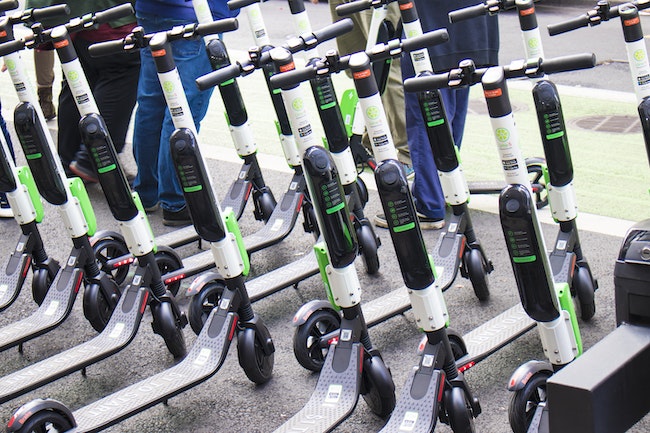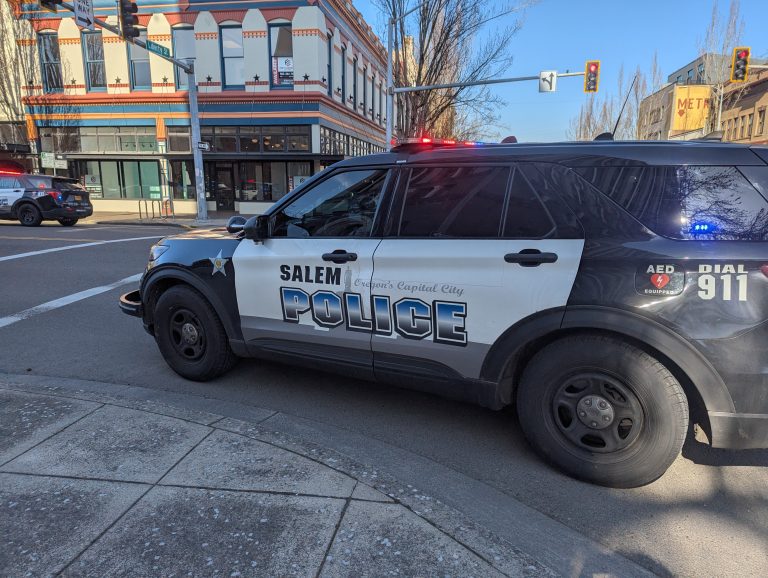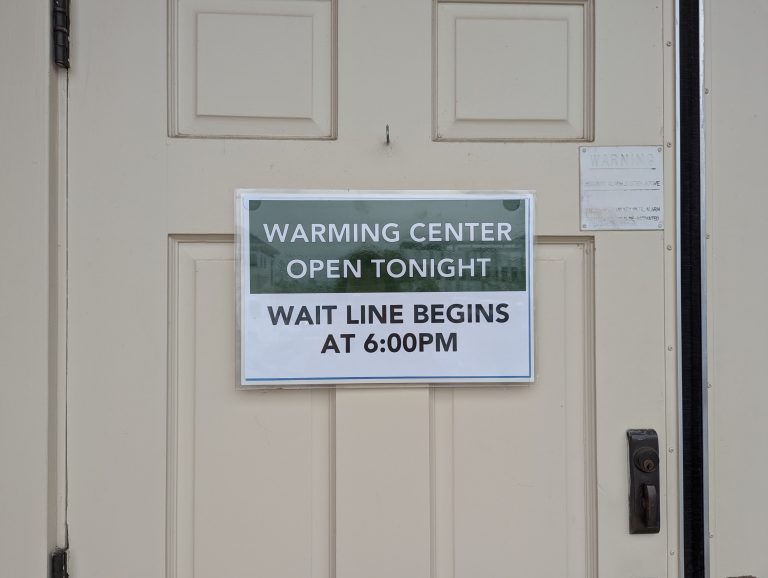Salem considers hopping aboard e-scooter trend

 A row of Lime-branded e-scooters at a recent safety event hosted by the Portland Bureau of Transportation in September 2018. (Courtesy/Portland Bureau of Transportation)
A row of Lime-branded e-scooters at a recent safety event hosted by the Portland Bureau of Transportation in September 2018. (Courtesy/Portland Bureau of Transportation)
E-scooters may soon zip around the streets of Salem, but city staffers must first figure out how they’re going to regulate the electric devices.
Companies like Lime, Bird, Spin, Gotcha and Zagster have all made pitches to the city since last winter, hoping to bring their pay-as-you-ride devices to Salem, officials tell Salem Reporter.
City Manager Steve Powers also wrote last week that staff will soon report to the Salem City Council on regulations need to be set up before those companies can operate in town.
“City staff are preparing the regulatory framework for electronic scooters,” Powers wrote Sept. 27. “Salem has been contacted by multiple scooter providers.”
The thrust of that staff work, according to Julie Warncke, transportation manager, is to figure out how the devices fit into current state and city laws, and what new rules, if any, need to be passed.
[ Help build Salem Reporter and local news – SUBSCRIBE ]
Laws already on the books govern motorized scooters, covering speed, who can ride them, and where they can and can’t be ridden. For example, state law forbids motorized scooters on sidewalks and city law forbids motorized scooters in parks.
But when it comes to the e-scooter industry, Warncke said the city is asking new questions.
“Are we going to limit the number of providers? Are we going to limit the quantity of scooters? Are we going to limit them to certain areas?” she said.
Warncke said there is no timeline for when staff take the report to council.
E-scooters, like ride-hailing services, have recently become a notably new-age way to travel around urban areas. They already operate in the areas like Seattle, Portland, San Francisco, Austin, Texas, and New York.
Customers are charged based on how long they use the scooter. Riders find and pay for scooters via an app. When they are done, they can leave them wherever — hence why the scooters are considered “dockless.”
The scooters are later retrieved by gig workers who are paid for every scooter they retrieve, charge and place back into the city.
When the scooters first came on the scene, they grabbed headlines for people throwing them into trees, leaving them strewn across sidewalks and more.
Mayor Chuck Bennett echoed Warncke’s questions of how the city can regulate scooters, and added that city officials want to ensure that e-scooters, should they arrive, don’t wreak havoc.
“There’s been enough reports on them in the national news and out of Portland that have indicated a whole range of issues, around their safety, around whether they get junked,” Bennett said. “How are they managed and kept track of?”
If the city does allow e-scooters to launch, Warncke said city staff will recommend structuring the launch to allow them a chance to address any unexpected issues that arise.
“We’d probably want to revisit whatever regulatory structure to ensure that it’s working, and if it needed tweaks,” Warncke said.
That would be similar to Portland, which initially gave e-scooters the green light for one 120-day pilot program. In that span, Portlanders rode the scooters more than 700,000 times, according to the Portland Bureau of Transportation.
READ: Portland Bureau of Transportation’s 2018 E-Scooter Findings Report
Portland launched a second pilot program in April to last a full year. Dylan Rivera, a spokesman for the transportation agency, said the second program came with harsher penalties for riders to curb illegal sidewalk riding and illegal parking. The city delivered about 340 warnings or fines in the first three months, Rivera said.
 Portlanders ride Lime e-scooters during an event teaching how to safely use the devices in September 2018. (Courtesy/Portland Bureau of Transportation)
Portlanders ride Lime e-scooters during an event teaching how to safely use the devices in September 2018. (Courtesy/Portland Bureau of Transportation)
Rivera said it’s unclear what will happen when the second pilot program ends.
“We’ve not determined if we’re going to create an ordinance to make shared e-scooter service permanent,” he said.
But Rivera said the city wanted to embrace e-scooters – like ride-hailing services — for the potential to cut down on traffic accidents, tailpipe pollution and gridlock.
“Five, six years ago, no one would have believed you could hail a car ride with your phone, and now on an average day we have more than 30,000 rides being hailed with Uber, Lyft, and taxis. That’s more than four times the number of taxi rides that were taken about five years ago,” he said.
“We think it’s worth exploring if shared e-scooters can help us meet the same goals we’ve always had,” he said.
If they arrive, e-scooters would join Ride Salem as the only shared mode of transport in Salem. The bike-sharing program launched in June.
READ: Bike share to launch around downtown Salem this month (June 5, 2019)
Evan Osborne, who helped spearhead the bike sharing program, said he and the nonprofit backing Ride Salem hope to bring e-scooters to Salem too.
“We are openly declaring that we’ll be in the e-scooter sector when Salem opens for e-scooter programs,” he said.
Osborne said the nonprofit is already in talks with a vendor, but he declined to say who. The bike share program is run in conjunction with Zagster, a Massachusetts firm that also has an e-scooter division.
Lime, one of the country’s most prominent e-scooter vendors, has also made its interest in the Salem market known to city officials.
“We’ve offered to the city that Salem would be a meaningful market for scooters, help take cars off the road and help connect people to transit,” said Jonathan Hopkins, a spokesman.
Have a tip? Contact reporter Troy Brynelson at 503-575-9930, [email protected] or @TroyWB.



